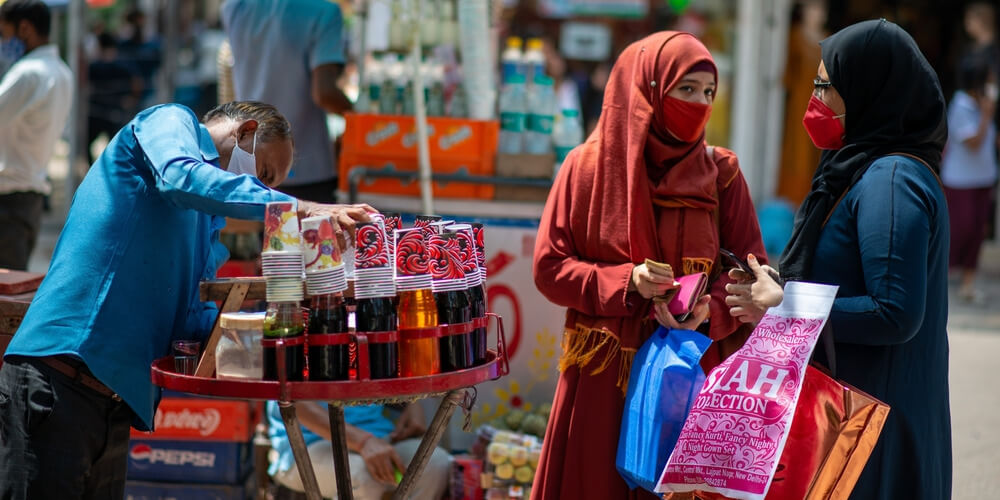Balance not always the case where politics and emotions take hold.
New Delhi: India’s predominant vegetarianism, religious complexities and a recent spurt in Islamophobic politics has stalled the development of a halal segment in a food and drink sector serving a country of 1.38 billion people.
Despite having the world’s second-largest Muslim population of more than 210 million, according to the US-based Pew Research Centre, Indian food manufacturers do not generally display halal on any food labels, except meat.
“In India, non-Muslims are not aware of the true meaning of halal and associate it with meat,” Waseem Akhtar, halal coordinator and auditor at the Delhi-based Jamiat Ulama Halal Foundation told Salaam Gateway.
He said Hindus think if it is halal, there must be some non-vegetarian ingredient in it. This is a problem given 44% of the 1.1 billion Indian Hindus are vegetarian.
Furthermore, as packaged Indian food products must specify any meat content with a red and green dot system (red meaning non-vegetarian and green vegetarian), the Muslim population need not worry about any non-halal meat content in the vegetarian food, Zia Nomani, vice-president for operations at the Mumbai-based Halal Council of India, told Salaam Gateway.
He added major Indian fast-moving consumer goods (FMCG) manufacturers use wholly vegetarian products, but halal consumers still need to read the ingredient lists to check if alcohol has been mixed into a product.
However, for many non-meat products, there was little difference between halal and vegetarian, said Nomani.
“Here, all the ice-creams are made by non-Muslims, but we Muslims consume them happily because we know there is no problematic ingredient. The situation is very different from countries such as Japan, Thailand, Vietnam and Taiwan that lack such a strong vegetarian tradition, where one cannot be certain of non-vegetarian ingredients in FMCG products,” he added.
Yet, this might change as halal committees are formed in these countries to make their products acceptable in Arab export markets.
| Read -
|
Manufacturers must be aware of food sensitivities between Muslim and Hindu
On a different note, the often-tense domestic Hindu-Muslim relations mean the country’s leading food manufacturers must watch sensitivities in the majority Hindu population when considering adding halal labels to locally sold products.
“A client once used leftover halal-labelled packages from an export consignment in the Indian market and consumers protested,” said Sayeed Mohammad Imran, head of operations for halal certification agency Halal India, based in Chennai, Tamil Nadu.
It was not an isolated incident. In March the right-wing Hindu organisation Bajrang Dal in the southern state of Karnataka erected posters during a local festival asking Hindu vendors not to buy halal meat and called on people to eat only at Hindu restaurants.
Imran said this was clearly “part of a campaign to hurt the Muslim community, which comprises 7.8 million of the overall state population of 61 million”. In addition, anti-Muslim activists have launched social media campaigns on Twitter with hashtags such as #BoycottHalalProducts, calling on Indians to shun goods with halal certification.
A typically extreme post made on 15 June 2022 called halal certification “the Islamic jihad route to Islamisation of India”.
Tacit support for moderate versions of such views can also be found among leaders of the ruling Bharatiya Janata Party (BJP). In March the BJP’s national general secretary CT Ravi told reporters in Bengaluru (Bangalore): “When they (Muslims) think halal meat should be used, what is wrong in saying it should not be used?”
Imran said this was a new trend.
His organisation has been operating for 12 years and, for most of this time, such anti-halal messaging has not been a problem. However, lately he has even been receiving emails saying “Stop Halal”.
“We tend to ignore them and move forward,” he said, indicating the situation in south India was less hostile than in the north, as fewer southern Indians object to halal products.
His agency is a testimony to the growth in Indian halal, despite these problems. It has 60 employees serving 2,000 clients and issues 30 new halal certificates for food, beverages, cosmetics and pharmaceutical products every month.
He noted there are more non-Muslim manufacturers seeking certificates to export halal products than Muslims, while, among Indian Muslims, halal labels and certifications were gaining traction.
Sarhad Maniyar, a resource scholar, and operations manager at the Mumbai-based Association of Muslim Professionals, told Salaam Gateway: “As a Muslim, we prefer to use more and more halal products. Personally, non-alcoholic restaurants are more halal because I do not like to use a glass that has been previously used for beer or wine.”
She agreed that across the country the supply of halal products was restricted, but said local markets for halal-labelled lines were growing in areas with higher proportions of Muslims.
In Jammu and Kashmir (J&K), home to 8.6 million Muslims, the religious body Muttahida Majlis-e-Ulema introduced halal certification in 2020, but only for modern packaged meat products.
“All Muslim butchers (selling meat in individual shops) do correct slaughtering so there is no need to give certificates to them,” Nazeer Ahmad Qasmi, member of the newly formed J&K Halal Food Certification Board, said.
Board members check and certify the slaughtering system of meat production and processing companies for all their products sold in the J&K Indian union territory. Qasmi said consumers only buy from them when companies have their certificate.
Elsewhere, more informal halal monitoring can take place. In Mumbai, where 2.5 million Muslims live, many butchers slaughter chickens in front of their customers so they witness first-hand whether halal slaughtering takes place, said Maniyar.
She added basic honesty often also prevailed. Non-Muslim shopkeepers tell customers if their meat has not been slaughtered according to halal rules.
“I have never come across anyone who is purposely trying to deceive someone on halal,” she said.
© SalaamGateway.com 2022. All Rights Reserved


Raghavendra Verma